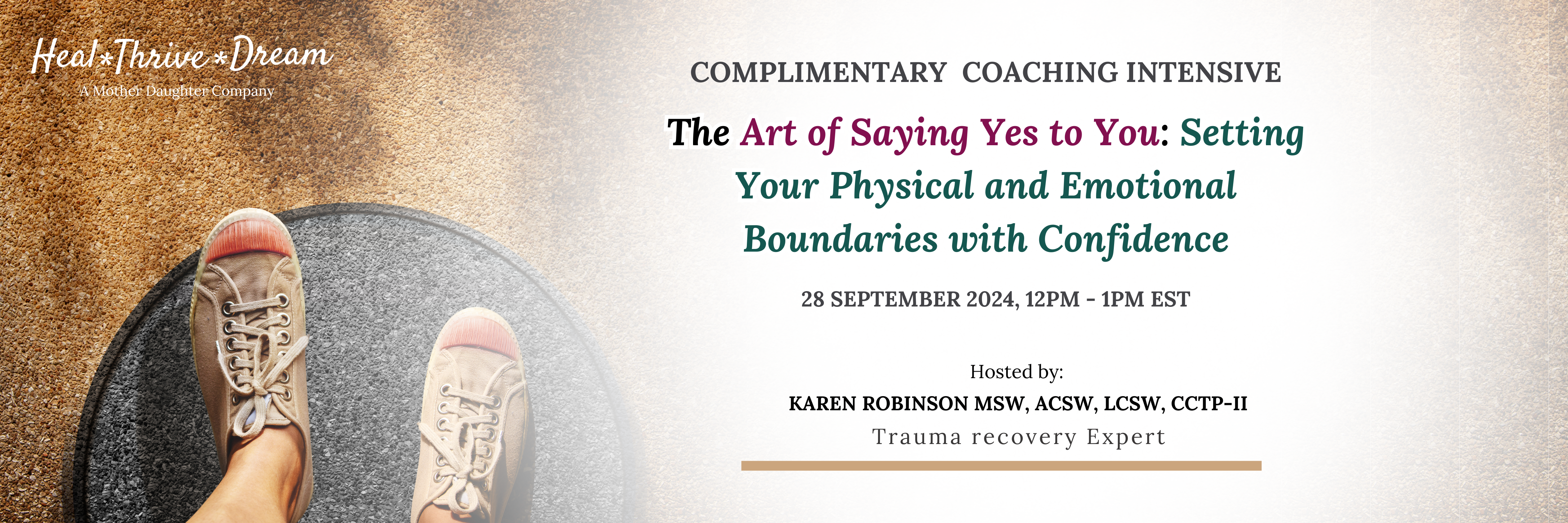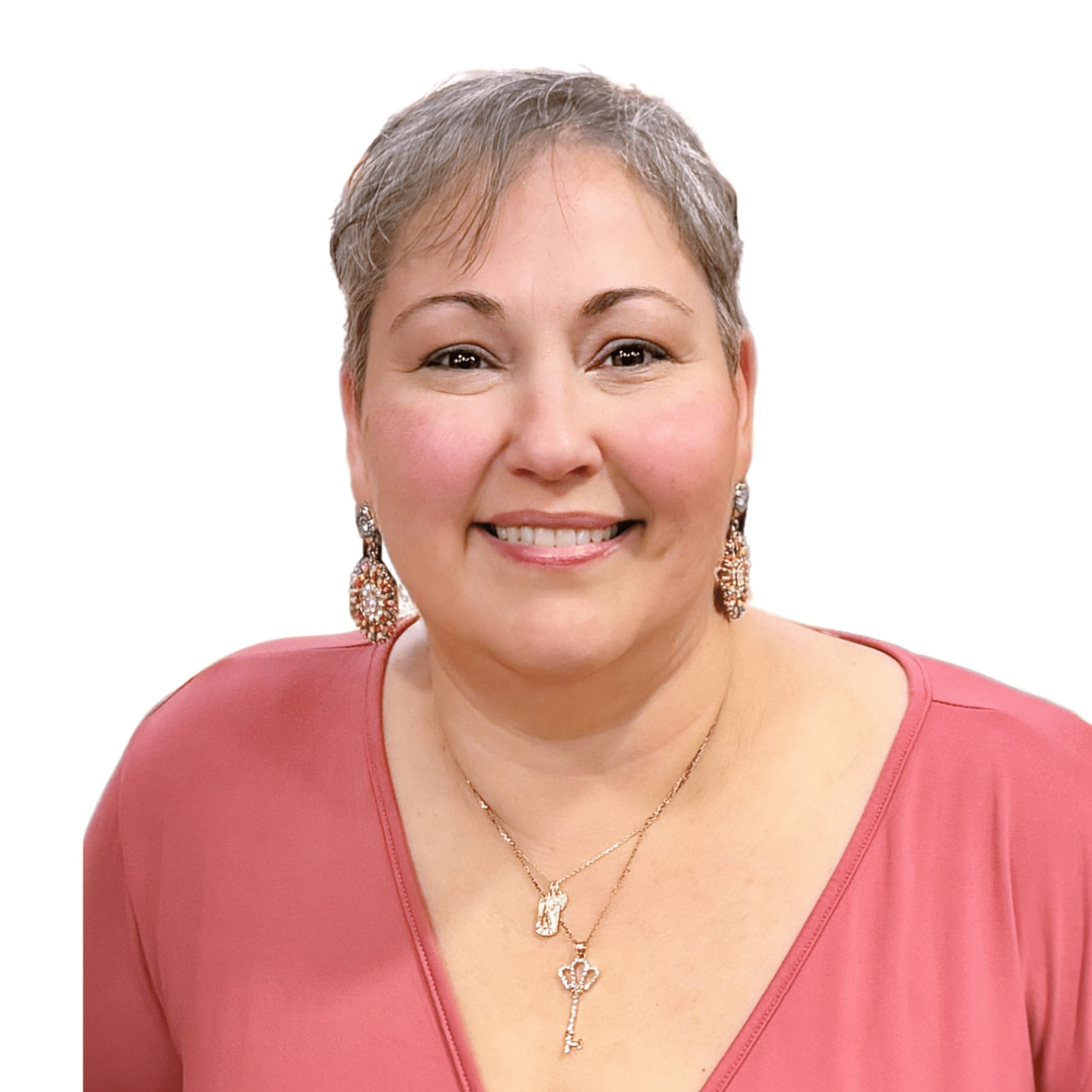Nurturing Your Emotional Boundaries After Trauma
Healing from trauma can often feel like an uphill battle, but there is hope. One powerful way to embark on your healing journey is by nurturing your emotional boundaries. While it may sound challenging, it's an important step toward reclaiming your inner peace and emotional well-being. In this blog post, we'll explore the process of healing from within and how nurturing your emotional boundaries can provide you with both relief and comfort.

Understanding Your Emotional Boundaries
Emotional boundaries are like a protective shield for your heart and soul. They define the limits of what you're comfortable with emotionally and help you maintain a sense of self. Unfortunately, trauma can shatter these boundaries, leaving you feeling exposed and vulnerable. But healing from within means you can rebuild these emotional fences, one baby step at a time.
Please attend my coaching intensive on boundaries to learn more.
Start with Self-Compassion
The journey to healing begins with self-compassion. Be gentle with yourself. Understand that healing is not a linear process. Some days, you'll feel like you're making leaps of progress, while on others, it may seem like you're taking small steps or even standing still. That's okay. This is not a race.
Here are three tips on becoming more self-compassionate:
- Acknowledge your pain - admit that you've been through a traumatic experience, and it's okay to feel hurt, angry, or confused. Your emotions may be mixed. All of your feelings are valid.
- Release self-blame/don’t claim the shame - It's essential to let go of self-blame. Remember that you did not cause the trauma; you are a survivor. Don’t take responsibility for something you didn’t do.
- Seek support - Reach out to friends, family, or a therapist who can provide you with the emotional support you need. Talking about your feelings can be incredibly therapeutic. I highly recommend a support group. Consider peer support and coaching.
Identify Your Emotional Triggers
Understanding your emotional triggers is a significant step in nurturing your emotional boundaries. Trauma can leave you with sensitivities to certain situations, people, or places that remind you of the traumatic event(s). Identifying your triggers can help you avoid unnecessary emotional distress and will help you understand yourself better.
Ways to know yourself better include:
- Journaling: With this practice, you will start to identify your patterns.
- Mindfulness: With this practice, you will stay in the present moment and observe your emotions without judgment.
- Set Healthy Boundaries: With the practice of identifying your triggers, you can then work on setting healthy boundaries to protect yourself from situations or people that intensify your emotional distress.
Learn to Say "No”
For many survivors of trauma, saying "no" can be a challenging task. This is with good reason. If you live with unsafe people or grew up in a dysfunctional home, it really wasn’t safe to say “no”. However, as an adult, learning to assertively say no is crucial for nurturing emotional boundaries. If you are currently living in an unsafe environment, your first step is escaping the prison you are living in. Reach out for help.
Call the National Domestic Violence Hotline. Support, resources and advice for your safety1-800-799-SAFE (7233)
When safe to do so:
Practice Saying "No” by starting with small requests from friends or family. Politely decline when you're not comfortable with something. Gradually, you'll become more confident in setting boundaries.
Prioritize Your Needs. Please understand that saying "no" is not selfish; it's an act of self-care. Prioritize your emotional well-being above the expectations of others. When you don’t do this, it leads to resentment and burnout.
Communicate Your Limits. Share with those close to you about your boundaries. This will help them understand your needs and provide you with the support you are requesting both emotionally and physically.
Embrace Healthy Self-Talk
Your self-talk is likely not always healthy. Our inner critic likes to attack, and it especially likes to attack when we are feeling vulnerable. Practicing healthy thinking and self-talk is like a soothing balm for your wounded soul. It involves replacing self-criticism with self-compassion and encouragement.
These are the steps I practice when my critical bug is biting me:
- I challenge my negative thoughts. Whenever I catch myself thinking negatively about myself, I immediately challenge them. A quick way to do this is to ask yourself if your thoughts are based on facts or are they distorted by trauma.
- I declare my affirmations. I practice healthy affirmations every chance I get to remind myself of my strength and resilience. I recommend you practice affirmations that you WANT to believe about yourself. Examples include: "I am worthy of love and healing," or "I am stronger than my past." For best results, practice these daily!
- Surround Yourself with Positivity. Spend time with people who uplift and support you. Their positive energy can help counteract negative self-talk. Watch positive programing such as motivational speakers who inspire you to live the life you deserve.
Explore or Reconnect with Your Passions
Reconnecting with your passions and hobbies can be a powerful way to nurture your emotional boundaries. Engaging in activities you love can provide you with a sense of purpose and joy.
Start by taking some time to explore activities that genuinely make you happy. It could be anything from painting to gardening, or even rediscovering a childhood hobby.
Set up a space where you can pursue your interests comfortably. This can be a corner in your home or a favorite outdoor spot. But don't pressure yourself to excel in your hobbies. The goal is not perfection; it's about enjoying the process and finding solace in your passions. If you want help with exploring your passions, consider a consult with me.
Your Healing Journey Continues
Healing from within and nurturing your emotional boundaries is a path filled with hope and promise. It's about recognizing your strength, resilience, and worthiness. As you walk your healing path, remember that you are not alone and that baby steps are okay. Many survivors have walked this road before you and have emerged with renewed hope, love, peace, and a sense of self.
By starting with self-compassion, identifying emotional triggers, learning to say "no," embracing healthy self-talk, and reconnecting with your passions, you are taking active steps toward healing. Your emotional boundaries are your sacred and empowering. Embrace this freer you.
Healing Coaching Intensive focused on boundaries




I had to put boundaries in after trauma as an act of self-preservation. Initially, people around me were bemused as I was always so willing to put my needs aside to care for them and it did cause some uncomfortable conversations. In contrast, people who did not know me before have accepted my boundaries without question and, although it may be my imagination, they seem to treat me with more respect. This has made it easier and easier to do as time has gone on and I recommend people at least try it. For me, it has become part of my healing process.
Hi Jo, Thank you for sharing us your trauma and your experience afterwards with self-preservation. I’m sorry this happened to you and I hope your healing journey is soothing your soul. I love how you advocate yourself and it sounds like you intuitively knew that boundary setting is a must for healing. Kudos to you and thank you for sharing! Karen